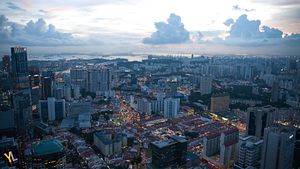Back in November 2015, Chinese President Xi Jinping met with then-Taiwanese president Ma Ying-jeou in Singapore, the first meeting between Chinese and Taiwanese leaders since the end of China’s civil war in 1949. While Singapore was happy to facilitate the meeting, former head of the Singaporean Ministry of Foreign Affairs and veteran diplomat, Ambassador Bilahari Kausikan, was quick to remind his many followers on Facebook :“We only provide the venue. Do not ascribe any larger role to us.”
The upcoming meeting between U.S. President Donald Trump and North Korean leader Kim Jong-un is no different.
Nevertheless, now that Singapore is on the radar, the United States and North Korea could both learn a thing or two from the city-state.
Change Things From the Inside
As a small country made up of 3.5 million citizens and 720 square kilometers of land, Singapore has had no choice but to pursue multilateral diplomacy, promote the international rule of law, and protect its national interests at global bodies such as the United Nations. Small states like Singapore are only as strong as the number of countries they persuade that we are all in this together.
The UN Convention on the Law of the Sea (UNCLOS) is a great example of this, given the island’s strategic location at the mouth of the Malacca Straits, through which about 40 percent of world maritime trade passes. The convention deals with all uses of the ocean, from shipping to fishing, territorial demarcation to right of passage. Following nearly a decade of negotiations, UNCLOS was finalized in 1982.
Professor Tommy Koh, then-Singapore’s Permanent Representative to the UN, was president of the Third UN Law of the Sea Conference and skillfully guided the more than 150 participating nations to reach an agreement. Today, 168 countries including the EU, Russia, China, and even North Korea are party to the agreement.
The United States, however, has yet to come on board. This is despite accepting and complying with most of the treaty’s provisions.
As the U.S. drags its feet, its warnings to China on its excessive claims in the South China Sea will continue to ring hollow. More importantly, Washington has no seat at the table in protecting U.S. rights and claims within the treaty’s institutional framework.
Similarly, the United States may not have liked the Iran nuclear deal, the Paris Climate Agreement, or the Trans-Pacific Partnership. But it would have been in a much stronger position leading from the inside rather than looking in from the outside as the rest of the world simply moved on.
Economic Power Is Real Power
An often-cited statistic about Singapore is how its nominal GDP per capita went from about $500 in 1965 (about the same as Mexico and South Africa at that time) to $56,000 in 2015 (closer to that of the United States and Germany). All this without any natural resources of its own. Singapore, in fact, still imports up to 40 percent of its water from its neighbor, Malaysia.
Singapore’s founding father, Lee Kuan Yew, developed his own brand of pragmatic politics that prioritized economic development through foreign investment and trade above all else. Inspired by what he saw in Singapore, China’s paramount leader Deng Xiaoping followed suit in 1978, with the “reform and opening up” program that has been the basis for China’s unprecedented economic growth and prosperity since.
North Korea, instead of developing nuclear weapons, should focus on its economy.
It wouldn’t be the first country to do so. Kazakhstan, which once held the fourth-largest nuclear stockpile with over 1,400 warheads, relinquished all of its Soviet-era weapons soon after independence from the Soviet Union in 1991.
As Kazakhstan’s UN ambassador noted while urging North Korea to follow in its footsteps, when Kazakhstan became independent overnight, it had no money and had runaway inflation. Regardless, the country chose to denuclearize because they wanted to “be known to the world not through nuclear capacity but economic might.”
Despite the crippling sanctions, there is some indication that the North Korean economy has improved slightly since Kim Jong-un took over in 2011. The Bank of Korea, the central bank in Seoul, estimated that the North Korean economy expanded by 4 percent to $28.5 billion in 2016, the fastest growth in 17 years.
One can only hope that for the many impoverished people in North Korea the Trump-Kim summit leads to less weapons and sanctions and more trade and investment.
A key lesson for both the United States and North Korea is that relentless engagement does not have to come at the cost of sovereign power.
Singapore “punches above its weight” because even as we pursue our national interests be it on trade, security or the environment, we try to make as many friends as we can along the way.
Chirag Agarwal is a former Singaporean diplomat currently working as a public policy consultant in Australia.

































